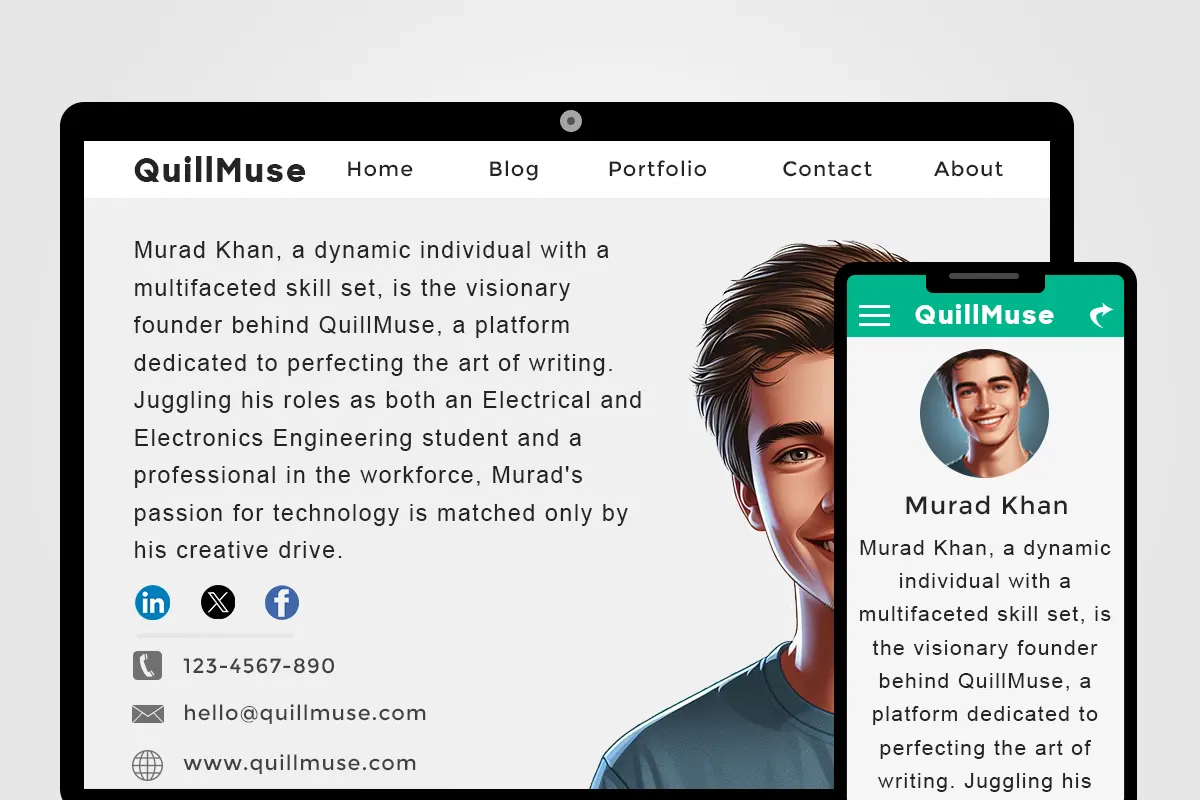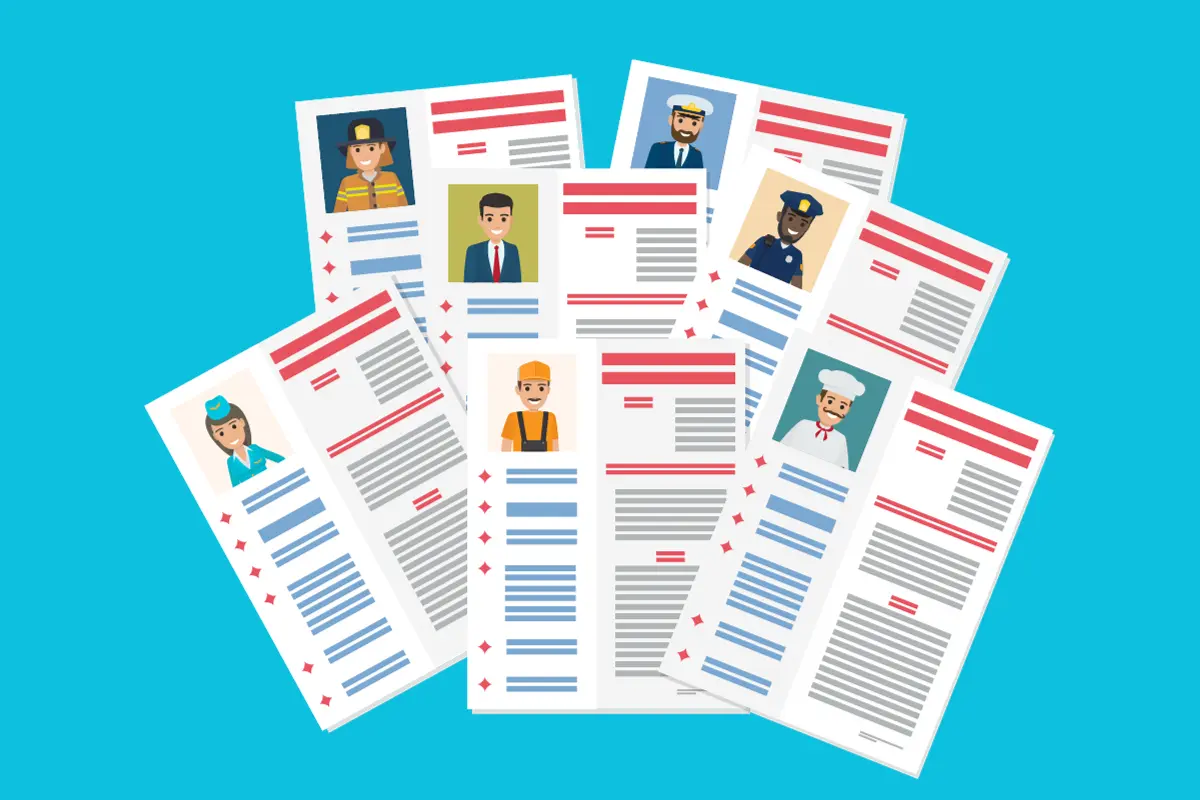How to Write a Biography About Yourself (Personal Bio) With Examples and Tips
Learn to write an engaging autobiography about yourself. Unlock your story's power and captivate readers. Start crafting your narrative today!

Zannat Mou
Last updated on Aug 27th, 2024

When you click on affiliate links on QuillMuse.com and make a purchase, you won’t pay a penny more, but we’ll get a small commission—this helps us keep up with publishing valuable content on QuillMuse. Read More.
Table of Contents
A personal biography, often shortened to just my self-biography, is a brief statement summarizing your skills and achievements. You can write a bio to differentiate yourself from other candidates, gain new clients, or connect with social media followers.
Learning how to write a biography about yourself can help you build your brand and market yourself effectively. In this article, we are going to discuss biography with steps, tips, and strategies to help you write how to write a biography about yourself.
Before writing, how to write a biography of yourself. First, we have to know what a personal biography is.
What is a personal biography?
A personal biography[1] is a brief introduction summarizing your experience, references, education, and personal or professional achievements. This can help you convey your brand and show others what makes you unique. You can use your profile as a marketing tool when applying for jobs, attracting potential clients, or encouraging people to follow you on social media.
A personal biography often conveys the purpose or goal of writing the biography, such as talking to a client or getting a job. In your biography, you can include details about your personal or professional achievements, such as awards you’ve won or positive feedback you’ve received from customers.
You don’t have just to write an essay about you. You may choose to discuss your personal or professional background in your biography, such as your current position, years of experience in the industry, or your motivation for pursuing your career path.
A personal biography typically mentions your education and other qualifications, such as internships, certifications, or professional development training.
What to include in a personal bio?
Here are some of the elements a personal bio might include:
- Name: [Your Name]
- Profession: [Your Job Title/Role]
- Experience: Briefly outline your relevant professional experience.
- Accomplishments: Highlight any notable achievements or milestones in your career.
- Skills: List key skills or areas of expertise relevant to your profession.
- Interests: Mention any hobbies or interests that showcase your personality outside of work.
- Unique Qualities: Highlight any unique traits or experiences that set you apart.
- Education: Include your educational background if relevant.
- Contact Information: Provide a way for people to contact you if they want to connect or collaborate.
Where To Show Personal Bio
Many people use their biography when looking for a job to explain to the hiring manager why they are the ideal candidate for the job. You can also use your biography in other ways. Some places you can post your biography include:
Shine Online:
- Social Media Bios: Carve out your digital footprint!
- Concise & Catchy: Twitter and Instagram bios thrive on brevity. Use keywords to grab attention and reflect your interests (e.g., “Foodie, Bookworm, Aspiring Cloud Architect”).
- Professional: LinkedIn allows for a more comprehensive bio. Craft a compelling summary that highlights your career journey, key skills, and achievements.
- Personal Website or Blog: If you have your own digital space, a dedicated “About Me” section is ideal. Here, you can delve deeper into your background, passions, and what makes you tick.
- Guest Posting Platforms: When contributing articles to other websites, some may have an author bio section. Craft a concise bio that piques the reader’s interest and potentially links back to your own website.
Offline Bio Beacons:
- Resumes & Cover Letters: In the professional realm, tailor your bio to resonate with the specific job or company. Highlight relevant skills and experiences that showcase your qualifications for the role.
- Networking Events: Prepare a succinct “elevator pitch” that summarizes your background and interests in a captivating way. This is your chance to make a lasting impression in a short interaction.
- Business Cards (Optional): While not a necessity, some people include a bio or tagline on their business cards. This can be a creative way to spark conversation and leave a memorable impression.
- Portfolios or Presentations: If you’re in a creative field, consider incorporating a bio section into your portfolio or presentation. This can add a personal touch and help potential clients or collaborators connect with you on a deeper level.
Remember, the key is to tailor your bio to the specific platform or situation. Think about your target audience and the message you want to convey. By strategically placing your bio in these online and offline spaces, you can effectively introduce yourself to the world and leave a lasting impression.
How to Write a Biography About Yourself

When you think you have to do something for your better career you must be alert about how to write a bio. Here’s an expanded take on how to craft a captivating biography about yourself in 6 steps:
1. Find Your Focus
Don’t just list facts, tell a story! Think about who will be reading it like a boss, classmate, or everyone. What’s the goal? Is it to show your skills for a job, your creative side, or everything about you?
This helps you decide what to write. For a job, focus on work experience, achievements, and skills that make you a good fit. For creative writing, mention what inspires you and the artists you like.
Think of important moments, big achievements, and things that make you unique. Then, write them down in a clear order, either by time (like your life story) or by topic (like focusing on skills).
2. Start Strong with a Hook
The first sentence is your chance to shine. Instead of a snoozer intro, write something that makes people curious. This could be a surprising fact about what you do, a quick story that hints at your personality, or even a question that sparks the reader’s imagination.
Think about how you’d introduce yourself to someone you really admire. What would you say to make them want to chat more? Do that in your first sentence. It’ll turn your bio into a “must-read.” After all, you’re an interesting person, so show it off from the very beginning.
Imagine you’re starting a conversation with someone you want to impress – how would you introduce yourself in a way that compels them to listen? So, I think you know how to write an introduction.
3. Showcase Your Journey
This is the heart of your biography, where your experiences come alive. Don’t just list accomplishments; delve deeper and showcase the challenges overcome, turning points that shaped you, and the triumphs you’ve achieved.
Instead of just stating you received a prestigious award, describe the project you tackled or the problem you solved that led to the recognition. Highlight the skills you honed along the way and how they contribute to your overall value.
Tell your story. Don’t just list your achievements. Show the interesting parts. What problems did you solve? What were the big moments? How did you learn and grow?
Pick things that impress the people you’re writing for. If it’s a job application, show skills that fit the job. If it’s for friends, tell fun stories. Use details to make your story come alive. Maybe you won an award. Instead of just saying that, tell them about the project you did.
4. Add Personality with Details and Voice
Spice it up! Don’t just tell people what you did, show them! Instead of saying “I won an award,” describe the cool project you worked on or the tricky problem you solved to earn it. Mention things you saw, heard, or even smelled that made the experience memorable.
A funny story shows you’re quick-witted, and a story about overcoming a challenge shows you’re a problem-solver. Write like you’re chatting with a friend. Don’t worry about using big words or sounding fancy. Just write the way you normally talk.
Are you known for your jokes? Let your sense of humor shine through. Are you super passionate about something? Let your enthusiasm jump off the page. The more you sound like yourself, the more interesting your story will be.
5. Keep it short
The length of your biography can vary depending on the focus and goals. On your social media site, you can write a brief professional biography of two or three sentences. Other bios, such as a website bio, can be several paragraphs long. No matter where you plan to display your biography, keep it short to grab readers’ attention and encourage them to learn more about you or connect with you.
6. Refine and Polish Your Work
Once you have a solid draft, take a critical eye and become your own editor. Proofread meticulously for typos, grammatical errors, and any awkward phrasing. Ensure the flow of your writing is smooth and the information is presented clearly.
Read your biography aloud to catch inconsistencies or areas that feel clunky. Having a trusted friend or colleague review it for clarity and impact can also be beneficial. Their fresh perspective might help you identify areas for improvement or ensure your message resonates with the intended audience. You don’t need to check for plagiarism.
7. Leave a Lasting Impression
The final sentence is your chance to create a memorable closing. This could be a powerful summary of your core values, a glimpse into your aspirations for the future, or a call to action that invites the reader to connect with you in some way.
This could be a quick summary of what’s important to you, a hint about your future goals, or even an invitation for the reader to connect in some way. The ending should leave a lasting impression that reflects who you truly are. Maybe you could end with a question that sparks a conversation or a quote that sums up your way of thinking.
8. Regularly update your profile
You are constantly learning new skills and achieving new goals in your career. Keeping these achievements to yourself will only limit your opportunities.
Instead, you should take a few minutes to update your various profiles every time you go through a major life event. This way, your biography will always accurately reflect who you are and what you have to offer, allowing you to gain better exposure, gain the respect of your peers, and ultimately be recruited.
9. Match the word count to the platform
While you analyze how to write a biography about yourself you should concern yourself with the word limit of the biography. The time it takes to write your biography is up to you unless you’re filling out the biography section of your profile and are only allowed a certain number of words. However, you should keep in mind your background and what your audience is looking for when deciding how much to write.
For example, people reading a biography on a job site may be screening many candidates, so it’s best to keep the biography on these sites short, between 300 and 500 words. Otherwise, readers may be tempted to ignore them.
For a biography on your website, a longer biography (between 1500 and 2000) is often better because you can include more details. Search engines also prefer longer bios, so they often rank higher in search results, making your bio more visible.
Tips for making your biography noticeable
1. Hook from the Start:
Skip the boring intro! Start your bio with something awesome! Think of a cool sentence, a surprising detail, or a question that makes people think. Imagine meeting someone interesting at a party. What would you say to grab their attention and make them want to chat more? This first line is super important because it sets the tone for your whole bio and makes people want to read on.
2. SEO Savvy:
If your bio is online, consider yourself a tiny search engine magnet! Strategically sprinkle in relevant keywords that people might use to find someone like you. Research keywords related to your profession, interests, or skills. For instance, an aspiring chef might include a “culinary student” or “food enthusiast” to attract potential employers or collaborators.
3. Paint a Picture with Words:
Instead of a laundry list of skills or interests, use vivid language and action verbs to showcase your passions. Don’t just say you’re “creative” – describe yourself as “brainstorming innovative solutions” or “transforming blank canvases into vibrant masterpieces.” This paints a picture for the reader and allows them to connect with your energy and enthusiasm.
4. Infuse Personality with a Pinch of Spice:
Let your unique voice and perspective shine through! A dash of humor (if the platform allows) can make your bio relatable and memorable. Are you known for your infectious laugh? Mention your “contagious enthusiasm for life’s adventures.” Do you have a quirky hobby or hidden talent? Share it! This personal touch allows people to connect with you on a deeper level.
5. Storytelling Power:
Weave a short, impactful anecdote that reveals something interesting about you. This personalized touch is far more engaging than a simple list of facts. Did a volunteer experience spark a passion? Briefly describe it! Did an unexpected encounter change your perspective? Share a snippet!
6. Sharp and Focused:
While you want to showcase your personality, remember bio real estate is precious! Strive for a concise and focused bio. Aim for a length suitable for the platform. Twitter thrives on brevity, so keep it short and sweet. LinkedIn allows for a more comprehensive summary but avoids rambling.
7. Intrigue with a Call to Action (Optional):
Depending on the context, consider including a call to action (CTA) at the end. This could be an invitation to connect with you on another platform, learn more about your work on a website or portfolio, or even a prompt to start a conversation. A strong CTA leaves a lasting impression and encourages further interaction.
Examples of Biography
Once you’ve crafted your bio, take a look at these biography examples to see how others have structured their personal and professional bios.

1. Bio for getting a job
I'm [Your Name], a highly motivated and results-oriented IT professional with [Number] years of experience in [Your area of expertise]. Throughout my career, I've thrived in fast-paced environments, and consistently exceeded expectations by troubleshooting complex technical issues and implementing innovative solutions.
My passion lies in [Specific area of IT you enjoy most]. In my previous role at [Previous company], I spearheaded the [Project name] initiative, which resulted in a [Quantifiable achievement related to the project]. I'm proficient in [List of relevant technical skills] and possess a strong understanding of [Industry knowledge related to your field].
Beyond technical expertise, I'm a strong communicator, adept at collaborating with cross-functional teams to bridge the gap between technical aspects and real-world business needs. I'm also a quick learner, always eager to stay up-to-date with the latest trends and technologies in the ever-evolving IT landscape.
I'm confident that my [Specific skills] combined with my [Positive personality traits] make me a valuable asset to any team. I'm particularly interested in opportunities that allow me to leverage my skills in [Areas you want to focus on] to contribute to [Desired company goals].
2. Examples of a biography that focuses on career and journey
They say curiosity is the seed of all discovery. Well, for me, it felt more like an insatiable fire. Growing up in Warsaw, science wasn't exactly a woman's domain, but the pull I felt toward unraveling the mysteries of the universe was undeniable.
It wasn't easy. Sacrifices had to be made to chase my dream. Paris, with its grand Sorbonne University, became my new home. There, amidst towering stacks of books and endless lab experiments, I met Pierre. He wasn't just my love, but a brilliant mind who shared my passion for the unknown. Together, we delved into the world of radiation, a realm then shrouded in mystery.
Our discoveries were like unearthing hidden treasures. Polonium, a new element I named after my homeland, then the wonder of radium – each revelation fueled our scientific hunger. Then came the heartbreaking loss of Pierre. Devastated, I considered giving it all up. But his spirit, his unwavering belief in our work, propelled me forward.
Becoming the first woman to win a Nobel Prize felt surreal, an acknowledgment of the battles fought and the path paved. Yet, the greatest reward was the knowledge that our research held the potential to heal, to illuminate the darkest corners of medicine.
The irony isn't lost on me. The very force I dedicated my life to understanding, radiation, ultimately took its toll. But even as my health declined, the fire of curiosity never truly dimmed. I hope that my journey, with all its struggles and triumphs, inspires others, especially young women, to chase their scientific dreams.
Conclusion
When applying for a job, one crucial factor that most individuals overlook is their “personal history.” Candidates’ dry and uninteresting personal histories don’t give them the credit they deserve because they don’t have enough time or aren’t aware of how important they are.
To pass difficult technical interviews in different companies, in addition to thorough preparation, creating and presenting the best personal biography is extremely important.
This article shows you how to write a biography about yourself and how to create the best personal biography to increase your chances of making a good impression and landing your dream job.
FAQs
Why should I write a biography about myself?
Writing your biography can be a powerful way to reflect on your life journey, document your achievements, and share your story with others. It can also be a valuable tool for personal branding and professional development.
What should I include in my biography?
Your biography should include important milestones, significant life events, challenges you’ve overcome, passions, interests, and goals. You can also include anecdotes, quotes, and insights that reveal your personality and values.
How do I structure my biography?
There’s no one-size-fits-all structure for a biography, but a common approach is to start with an introduction that grabs the reader’s attention, followed by chronological or thematic sections that explore different aspects of your life, and a conclusion that ties everything together.
Should I include personal details in my biography?
It’s up to you how much personal information you want to include in your biography. While sharing some personal details can make your story more relatable and engaging, it’s essential to strike a balance and maintain your privacy.
How long should my biography be?
The length of your biography will depend on its purpose and where it will be published. For personal websites or social media profiles, a shorter bio of around 100-200 words may be sufficient. For more detailed accounts, aim for 500-1000 words or more.
How we've reviewed this article
Our content is thoroughly researched and fact-checked using reputable sources. While we aim for precision, we encourage independent verification for complete confidence.
1. Learn more about biography: https://en.wikipedia.org/wiki/Biography
We keep our articles up-to-date regularly to ensure accuracy and relevance as new information becomes available.
- Current Version
- Aug 27th, 2024
- Oct 24th, 2023



